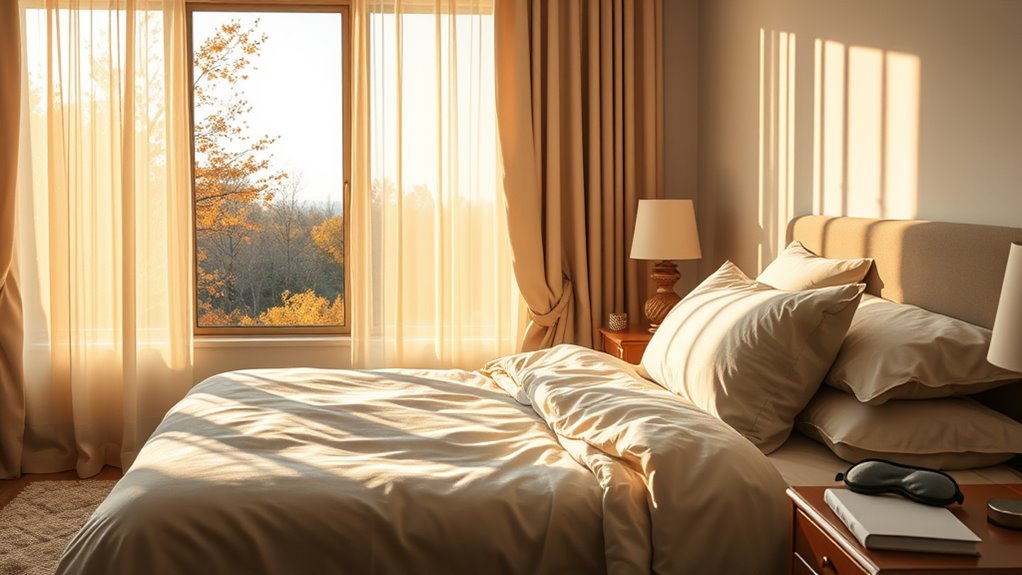Seasonal affective patterns impact your Monday energy by reducing sunlight exposure during fall and winter, which lowers vitamin D levels and mood. Less natural light can make you feel sluggish, less motivated, or tired at the start of the week. Weather changes, like overcast skies or cold temperatures, also play a role in dampening enthusiasm. Staying proactive with light therapy, outdoor time, and healthy habits can help maintain your energy—discover more ways to stay energized throughout the seasons.
Key Takeaways
- Reduced sunlight during fall and winter decreases Vitamin D levels, leading to lower mood and energy on Mondays.
- Shorter daylight hours delay circadian rhythms, causing later wake times and decreased Monday alertness.
- Overcast and gloomy weather on Mondays can diminish motivation and increase feelings of lethargy.
- Lack of natural light hampers serotonin production, resulting in mood dips that impact Monday productivity.
- Implementing light therapy and outdoor exposure can help counteract seasonal affective patterns affecting Monday energy.
Understanding Seasonal Affective Patterns

Understanding seasonal affective patterns helps you recognize how changes in daylight and weather can influence your mood and energy levels throughout the year. During fall and winter, photoperiod shifts reduce daylight hours, leading to less exposure to natural light. This decrease can lower your Vitamin D levels, which play a vital role in regulating mood and energy. When sunlight diminishes, your body produces less Vitamin D, impacting neurotransmitter function and contributing to feelings of fatigue or sadness. Recognizing these patterns allows you to anticipate how seasonal changes might affect you. By understanding the relationship between photoperiod shifts and Vitamin D levels, you can better prepare strategies to maintain your energy and mood during darker months. Incorporating light therapy or spending time outdoors during daylight hours can help counteract some of these effects. Additionally, maintaining a balanced diet rich in Vitamin D sources can support your overall well-being during low-light seasons. Engaging in mindfulness techniques, such as meditation or visualization, can help mitigate some of the emotional impacts associated with these seasonal changes.
The Connection Between Seasons and Mood

You probably notice your mood shifts with the seasons, especially when sunlight is scarce. Less sunlight can make you feel less happy and more sluggish, while brighter days lift your spirits. Weather changes, like rain or cold, also influence how energized or down you feel. Incorporating seasonal affective disorder strategies into your routine can help maintain your hair health despite seasonal weather fluctuations. Additionally, advancements in AI technology, such as on-device AI capabilities, are transforming how we adapt to these seasonal changes by offering personalized health and wellness solutions. Modern heating devices like heated mattress pads with safety features can provide immediate comfort and warmth during colder months, helping to boost your overall mood and energy levels.
Sunlight and Happiness
Sunlight plays a crucial role in influencing our mood, with longer days often bringing a sense of happiness and energy. Exposure to natural light helps your body produce serotonin, which enhances mood and promotes feelings of well-being. During darker months, you might notice your energy dips and motivation wanes. Light therapy can help regulate your mood by mimicking natural sunlight, especially when outdoor exposure is limited. This approach supports mood regulation and can reduce symptoms of seasonal affective disorder. By increasing your light exposure, you help align your internal clock, improving overall mood and Monday energy levels. Incorporating professional voice techniques into your routines can further boost your enthusiasm and vitality during the darker seasons. Additionally, maintaining a consistent sleep schedule and engaging in mindfulness practices can amplify the positive effects of increased sunlight. Being aware of asset division strategies can help you navigate financial planning during seasonal changes and life transitions. Utilizing proper headphone use can also enhance your relaxation and focus, contributing to better mood regulation. Embracing sunlight’s benefits can make a noticeable difference in how you start your week, boosting positivity and vitality during the darker seasons.
Weather’s Impact on Mood
Weather conditions profoundly influence your mood throughout the year, shaping how energized or sluggish you feel from season to season. Cloudy skies, rain, and cold temperatures can dampen your spirits, while sunshine boosts your motivation. Weather psychology shows that your emotional state reacts to these changes, often affecting your Monday energy levels. During darker months, light therapy can help counteract seasonal dips. Imagine this scene:
| Sunny & Warm | Overcast & Cool | Stormy & Cold |
|---|---|---|
| Brightening mood | Gloomy days | Dropping energy |
| Energizing sunlight | Gray skies | Thick clouds |
| Clear skies | Dampness | Heavy rain |
This imagery highlights how weather shapes your mental state and underscores the importance of managing mood with strategies like light therapy to stay positive year-round. Additionally, incorporating certain essential oils such as lavender oil can promote relaxation and uplift your spirits during gloomy days. Recognizing the influence of seasonal affective patterns on your energy levels can help you adopt effective coping strategies and maintain a balanced mood regardless of the weather. Furthermore, research into AI security vulnerabilities emphasizes the importance of developing robust safety measures to ensure AI tools remain trustworthy in various applications. Staying informed about potential cyber threats is crucial for maintaining your digital well-being.
How Light Exposure Affects Energy Levels

Light exposure plays an essential role in regulating your energy levels throughout the day. Natural sunlight boosts your alertness and helps maintain your circadian rhythm. When you’re exposed to sunlight, your body produces vitamin D, which supports overall energy and mood. Insufficient light, especially during darker months, can lead to fatigue and low motivation. Artificial lighting can help compensate, but it’s often less effective than natural light. To optimize your energy, consider:
- Spending time outdoors during daylight hours
- Using bright, full-spectrum artificial lights indoors
- Ensuring your environment has ample natural light
- Taking vitamin D supplements if sunlight exposure is limited
- Incorporating automation technologies to better manage lighting and optimize exposure throughout your day
- Paying attention to seasonal lighting changes, which can significantly impact your energy levels and mood. Additionally, understanding nutritional strategies, such as consuming nutrient-rich foods and juices, can further support your energy levels during seasonal variations. Recognizing the importance of light-dark cycles can help you align your routines for improved energy and well-being.
Seasonal Changes and Sleep Patterns

As seasons change, you might notice your sleep patterns shifting with the varying daylight hours. Longer nights can lead to increased sleep duration, while shorter days may cause you to feel more alert. Understanding how light exposure affects your sleep can help you stay balanced year-round. Additionally, electric power generation with bike generators can contribute to overall well-being by reducing reliance on traditional energy sources, which may also help alleviate stress and free up time for rest. Incorporating lifestyle adjustments such as optimizing your sleep environment and managing light exposure can further support your energy levels throughout the seasonal transitions, especially when considering the importance of projector bulb maintenance to ensure a comfortable entertainment environment during darker evenings.
Light Exposure Variations
Have you noticed how your sleep patterns and energy levels shift with the changing seasons? Light exposure plays a vital role in this cycle. During darker months, reduced natural light can lead to lower mood and energy, especially on Mondays. You might rely more on artificial lighting indoors, which doesn’t mimic sunlight and can disrupt your circadian rhythm. Light therapy lamps are an effective way to boost your light intake, helping to regulate your internal clock. To optimize your light exposure, consider:
- Spending time outdoors during daylight
- Using bright, full-spectrum artificial lights indoors
- Incorporating light therapy sessions in winter
- Reducing screen time before bedtime, which emits blue light that interferes with melatonin production
Adjusting your light exposure can help balance your energy levels and improve your mood throughout the season. Proper light exposure is essential for maintaining a healthy circadian rhythm and overall well-being. Additionally, choosing appropriate lighting technology can enhance the effectiveness of your light therapy and indoor lighting strategies, especially as recent AI discoveries have shown potential in developing innovative solutions for health and wellness. For example, smart lighting systems can automatically adjust brightness and color temperature based on the time of day, further supporting your biological clock.
Sleep Duration Shifts
Seasonal changes often influence how long you sleep each night, with many people experiencing variations throughout the year. These shifts happen because your body’s melatonin regulation adjusts to changing daylight hours, affecting your sleep duration. During winter, shorter days can cause your circadian shifts to delay melatonin release, leading you to sleep longer. Conversely, in summer, longer daylight hours promote earlier melatonin suppression, resulting in shorter sleep periods. These natural fluctuations can impact your Monday energy levels, making you feel more sluggish after longer winter sleep or more alert during summer. Understanding how seasonal sleep duration shifts affect you allows you to better manage your schedule and optimize your energy throughout the year.
The Impact of Weather on Motivation

Weather conditions can substantially influence your motivation levels throughout the week. Sunny days often boost your energy, while overcast or rainy weather can dampen your drive. Reduced sunlight limits your body’s production of Vitamin D, which plays a role in mood regulation and motivation. To adapt, your body needs weather adaptation strategies, like spending time outdoors when possible or using light therapy lamps.
Consider these factors:
- Lack of sunlight decreases Vitamin D, impacting mood and energy
- Cold, gloomy weather can trigger lethargy
- Wind and rain may discourage outdoor activity
- Seasonal shifts affect your psychological readiness to tackle tasks
Being aware of these weather influences helps you adjust your mindset and stay motivated despite unfavorable conditions.
Strategies to Combat Seasonal Energy Fluctuations

When energy levels dip due to shorter days and reduced sunlight, implementing targeted strategies can help maintain your motivation. Engaging in motivational exercises like brisk walks or stretching boosts your mood and energy. Dietary adjustments, such as consuming foods rich in vitamin D and omega-3s, support your body’s natural rhythms. Consider this quick guide:
| Strategy | Action | Benefits |
|---|---|---|
| Motivational exercises | Incorporate daily movement | Elevates mood, increases energy |
| Dietary adjustments | Eat nutrient-rich foods | Supports mental clarity |
| Light therapy | Use a lightbox during mornings | Mimics sunlight, boosts alertness |
These small changes can make a significant difference in counteracting seasonal energy fluctuations.
Tips for Maintaining Consistent Monday Productivity

Starting your week with focused momentum sets the tone for sustained productivity. To maintain consistent Monday energy, incorporate mindfulness practices that help you stay present and reduce stress. These can include deep breathing exercises or quick meditation sessions at the start of your day. Additionally, making dietary adjustments—like eating a balanced breakfast rich in protein and complex carbs—can boost your energy levels. Prioritize planning your day ahead to set clear goals and avoid feeling overwhelmed. Keep hydrated and limit sugar to prevent energy crashes. Regular movement, even a brief walk, can also refresh your mind. Consider these strategies to overcome seasonal energy dips and start your week energized and focused.
Frequently Asked Questions
Can Diet Influence Seasonal Energy Fluctuations on Mondays?
Your diet can definitely influence how you handle seasonal energy fluctuations on Mondays. Consuming nutrient-rich foods boosts your mood and energy, while avoiding sugar crashes helps maintain stability. Additionally, increasing light exposure during the day and practicing good sleep hygiene support your body’s natural rhythms, reducing seasonal lows. By focusing on balanced eating, proper light, and quality sleep, you can better manage those energy dips and start your week more energized.
How Do Physical Activities Impact Monday Energy During Different Seasons?
You can boost your Monday energy through physical activities like outdoor workouts and seasonal sports, which vary with the seasons. During warmer months, outdoor runs or cycling energize you, while in colder seasons, indoor sports help maintain activity levels. Regular movement improves your mood and vigor, helping you start the week strong. Adjust your routines seasonally to stay motivated, ensuring your energy remains consistent regardless of the time of year.
Are There Specific Supplements That Help Stabilize Seasonal Mood Changes?
Imagine a shield against the winter blues—certain supplements can act as your armor. Vitamin D is essential, especially during darker months, helping to stabilize mood swings. Omega-3 fatty acids support brain health and combat seasonal depression. Taking these supplements regularly can help you feel more balanced and energized on Mondays, making it easier to face the week with positivity. Always consult a healthcare professional before starting new supplements.
Does Mental Health Therapy Improve Monday Energy Levels Seasonally?
Mental health therapy can boost your Monday energy, especially when combined with light therapy, which helps improve mood stabilization during darker seasons. By addressing underlying emotional challenges, therapy equips you with coping strategies, making Monday mornings feel less intimidating. When paired with light therapy, it enhances your overall seasonal mood stability, ensuring you start each week with better energy and a more positive outlook.
How Does Seasonal Variability Affect Long-Term Monday Productivity Strategies?
You need to adapt your long-term Monday productivity strategies to seasonal changes. By increasing light exposure during darker months and maintaining sleep consistency, you boost your energy levels. Recognize that shorter days can lead to lower motivation, so plan activities that maximize natural light and prioritize quality sleep. Adjusting your routines seasonally helps you stay productive, regardless of how the seasons shift, ensuring you stay energized and focused every Monday.
Conclusion
By understanding how seasonal affective patterns influence your energy, you can better navigate those Monday blues. Think of your energy levels like a garden that needs regular care—light exposure, sleep, and motivation are your tools. When you adapt to seasonal changes, Mondays become less intimidating, and your productivity can flourish. Remember, just as seasons change, so can your energy—embrace the shifts and keep your motivation blooming all year round.









